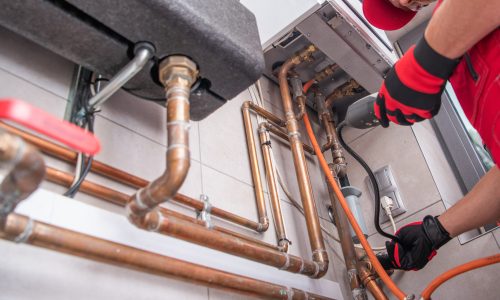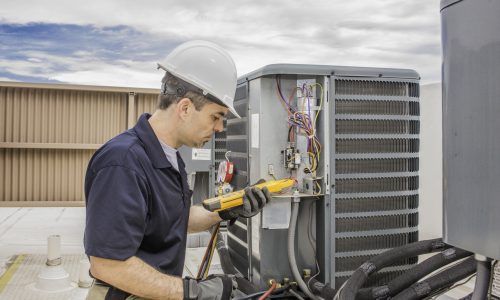In the modern era, where energy efficiency and environmental sustainability are of the utmost importance, HVAC system maintenance is indispensable. Leak detection and repair are essential aspects of HVAC maintenance, as leakage can contribute to energy waste, higher utility bills, and diminished indoor air quality. Purchasing a quality HVAC leak detector is highly recommended to ensure accurate and efficient leak detection.
This article explains what HVAC leak detectors are, their benefits, how they operate, how they differ from other detectors, what factors to consider prior to making a purchase, the importance of HVAC professionals in leak detection, and emerging technologies in leak detection and repair.
What are HVAC leak detectors?

Leak detectors for HVAC systems are specialized devices designed to detect and locate refrigerant leakage in HVAC systems. Leaks in components such as coils, valves, connectors, and connections can result in a loss of cooling capacity, decreased system efficiency, and potential environmental damage. Leak detectors for HVAC systems use cutting-edge technology to detect even the smallest breaches, ensuring prompt repairs and preventing complications.
The benefits of using an HVAC leak detector
include Many benefits for residential and commercial users who purchase a quality HVAC leak detector. Let’s analyze some of the major benefits:
Energy Efficiency
Leaks in an HVAC system can result in significant energy loss as the system attempts to compensate for the lost refrigerant. A HVAC leak detector helps restore optimal system performance by promptly detecting and rectifying leakage, thereby reducing energy consumption and utility bills.
Environmental responsibility
Many refrigerants used in HVAC systems, including chlorofluorocarbons (CFCs) and hydrochlorofluorocarbons (HCFCs), contribute to the depletion of the ozone layer and global warming. By detecting breaches early, an HVAC leak detector contributes to environmental sustainability by preventing the discharge of these hazardous substances into the atmosphere.
Cost-Savings

Early detection and repair of HVAC leakage can prevent costly repairs and replacements in the future. A HVAC leak detector helps prevent significant system malfunctions by identifying problems early on, thereby extending the equipment’s lifespan and preventing costly repairs and replacements.
Improved Indoor Air Quality
HVAC breaches can introduce contaminants into the indoor air, resulting in poor indoor air quality and possible health problems. A HVAC leak detector helps maintain a healthy and comfortable environment for building occupants by locating and repairing breaches.
How does an HVAC leak detector work?
Electronic sensing, ultrasonic detection, and infrared technology are some of the fundamental technologies HVAC leak detectors utilize. Electronic leak detectors are among the most prevalent in their field. They must detect the presence of refrigerant gasses in the air in order to function. When the detector comes into contact with the leaking refrigerant, an audible or visual alarm is triggered, alerting the user to the location of the breach.
In contrast, ultrasonic leak detectors use sound vibrations to detect breaches. They are able to recognize the high-frequency sound generated by turbulent gas flow at a breach site. These detectors transform ultrasonic signals into audible sounds or visual indicators, allowing users to pinpoint the source of a spill precisely.
Infrared leak detectors detect refrigerant leakage using infrared sensors. These detectors compare the infrared radiation emitted by the leaking refrigerant with the ambient environment. Variations in the infrared radiation emitted assist in identifying the presence and location of a breach.
How are HVAC leak detectors different from other detectors?
There are a variety of leak detectors on the market, but HVAC leak detectors are designed specifically to meet the requirements of HVAC professionals and system owners. HVAC leak detectors are calibrated to detect refrigerant gasses commonly used in HVAC systems, ensuring accurate and reliable detection.
In addition, HVAC leak detectors typically have features and capabilities that are specific to HVAC systems. They may include sensitivity levels that can be adjusted to detect large and small breaches and filters that eradicate false alarms caused by other gasses or substances commonly found in HVAC environments.
Some advanced models may even include digital displays, data recording capabilities, or wireless connectivity for simple leak detection, monitoring, and reporting. Additionally, HVAC leak detectors are designed for portability and simplicity of use. They are lightweight, portable tools that can be maneuvered easily in confined spaces or complex HVAC systems.
This enables technicians to efficiently scan various components and areas of the system to detect leakage without causing unnecessary disruption or disassembly. An advanced leak detector lets HVAC professionals quickly pinpoint refrigerant leaks, enabling efficient repairs and optimal system performance.
What should I take into account before buying an HVAC leak detector?
There are several factors to consider when selecting the ideal HVAC leak detector for your needs:
Method of detection
Evaluate the detection technique that meets your needs and preferences. Ultrasonic and infrared detectors may offer specific advantages in certain circumstances, whereas electronic leak detectors are generally effective and extensively used.
Sensitivity levels
Ensure that the HVAC leak detector’s sensitivity can be adjusted to detect both large and minor breaches. This adaptability enables you to tailor the detector’s performance to the HVAC system you’re working with.
Simplicity of use
Look for an HVAC leak detector that is intuitive and user-friendly. Alarms, visual indicators, and clear displays contribute to the operability and accuracy of the leak detection system.
Portability and longevity
Consider the detector’s portability and durability, particularly if you need to detect leaks in various locations or challenging environments. A lightweight and durable design will increase the device’s usability and longevity.
Adjustments and maintenance
Determine whether the HVAC leak detector requires periodic calibration or maintenance. Some detectors may require periodic calibration to maintain accurate results, while others may offer convenient self-calibration capabilities.
Budget and value
Determine your budget and pursue the greatest investment value. Find the HVAC leak detector that offers the optimal balance of performance, dependability, and cost-effectiveness by comparing the prices, features, and reviews of various models.
Importance of HVAC professionals in leak detection and repair

When it comes to detecting and repairing HVAC leaks, the expertise and skills of HVAC professionals are indispensable. These professionals have the necessary knowledge and experience to effectively identify, locate, and repair HVAC system issues. Here is an overview of their main aspects in leak detection and repair:
- Training and Certification: By obtaining appropriate training and certification, HVAC professionals ensure that they possess the skills necessary to detect and remedy leaks in a safe and efficient manner.
- Expertise in Diagnosis: Their diagnostic expertise enables them to evaluate the severity and impact of leakage on system performance and to suggest appropriate repair solutions.
- Right tools and equipment: The combination of tools and their expertise enables HVAC professionals to efficiently navigate HVAC systems, locate breaches, and evaluate their severity. With an electronic leak detector, HVAC professionals can confidently locate and diagnose refrigerant leaks, enabling them to take proactive measures and prevent further damage to the system.
- Preventative Maintenance: By addressing prospective problems before they worsen, HVAC professionals extend the lifespan of HVAC systems and reduce the need for costly repairs.
- Compliance with Regulations: They maintain knowledge of the most recent environmental regulations, such as those concerning refrigerant phaseouts and escape rate allowances. By adhering to these regulations, HVAC professionals ensure the legal compliance of HVAC systems under their care and contribute to environmental sustainability.
Emerging technologies for detecting HVAC leaks
As technology continues to advance, the field of HVAC leak detection also evolves. The accuracy, efficiency, and convenience of detecting and repairing HVAC system leakage are constantly being improved by the development of novel technologies. Here are several emerging technologies that are influencing the future of HVAC leak detection:
Detection through Ultraviolet (UV) Dye
UV dye detection involves injecting a fluorescent dye that circulates with the refrigerant into the HVAC system. When a breach occurs in an HVAC system, the pigment escapes with the refrigerant and can be detected with a UV light or lamp. This method provides a visible and precise indication of the location of even the smallest or most inaccessible breaches.
Optical Gas Imaging (OGI)
The OGI technology employs infrared cameras to detect and visualize refrigerant leakage. The cameras detect the infrared radiation emitted by the refrigerant that is escaping, enabling technicians to pinpoint the precise location of the breach. This non-invasive technique provides a rapid and thorough assessment of the system, making it particularly useful for large industrial HVAC systems.
Wireless sensor networks
Wireless sensor networks are becoming increasingly prevalent in HVAC leak detection. These networks are small, wireless sensors strategically positioned throughout the HVAC system to perpetually detect leakage. The sensors communicate with a central center or software platform to provide real-time information on the location, severity, and trends. This technology permits proactive leak detection and remote monitoring, making it especially advantageous for large or complex HVAC installations.
Laser spectroscopy

Laser spectroscopy is a sophisticated technique that employs laser beams to analyze the ambient air’s gas composition. The technology can accurately identify breaches by detecting specific gas signatures, such as refrigerants. Laser spectroscopy provides rapid detection and can be integrated into portable devices or permanently installed in HVAC systems for continuous monitoring.
Machine learning and artificial intelligence (AI)
To enhance the accuracy and efficacy of HVAC leak detection, AI and machine learning algorithms are being implemented. By assessing historical data, these algorithms are able to discover patterns and correlations, facilitating breach detection and automated defect diagnosis. HVAC leak detectors powered by artificial intelligence can aid technicians in making data-driven decisions, optimizing maintenance schedules, and reducing false alarms.
Even though these emerging technologies show promise, it is essential to note that they may still be in the early phases of development or have limited availability. Nonetheless, as they continue to develop, they have the potential to revolutionize the field of HVAC leak detection by providing enhanced capabilities, quicker detection times, and enhanced dependability.
Conclusion
Any HVAC professional or system owner would be prudent to invest in a high-quality HVAC leak detector. The advantages of accurate leak detection, including improved energy efficiency, environmental responsibility, cost savings, and improved indoor air quality, make it a valuable tool for ensuring the optimal performance of HVAC systems.
By understanding how HVAC leak detectors function, how they differ from other detectors, and the most important factors to consider prior to purchase, you can make an informed decision and choose the best HVAC leak detector for your particular requirements. With a dependable and effective HVAC leak detector, you can effectively detect and address leakage, ensuring your HVAC system’s durability, efficiency, and longevity.
If you are looking to service your HVAC system, you may want to consider Autumn Air for our highly professional services. Call us at (602) 266-5247 or schedule our service here.
